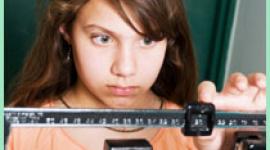Signs You Have an Unhealthy Relationship with Food
About Eating Disorders
 Eating disorders both are and are not what they sound like. On the one hand, eating disorders are a group of symptoms with one of the primary problems being an unhealthy relationship with food. On the other hand, the symptoms of an eating disorder are methods used to cope or manage other problems in an individual's life, problems that are unique to each person.
Eating disorders both are and are not what they sound like. On the one hand, eating disorders are a group of symptoms with one of the primary problems being an unhealthy relationship with food. On the other hand, the symptoms of an eating disorder are methods used to cope or manage other problems in an individual's life, problems that are unique to each person.
Below we describe the features of eating disorders to give you some ways to tell if you or someone you know has an unhealthy relationship with food. Seeing if you have these problems is the first step. Treatment involves both learning how to manage the symptoms themselves, figuring out how the symptoms help the individual to cope, and learning alternative ways to cope that are more effective.
People are told "You have an eating disorder" when they have several of these features. However, the more we learn about these disorders, the more we realize that meeting all the "criteria" is not what is important. People who only have some of these features are often experiencing as much unhappiness and distress as someone who has all of them. Ask yourself if any of these features bother you or interfere with your life (happiness, job, school, relationships,) or interferes with the life of the person with whom you are concerned.
FEATURE 1: The individual has an unhealthy relationship with food. Food is supposed to nourish our bodies. We need food to live. When eating becomes a source of guilt, shame, or fear then this relationship has become unhealthy. Eating should be one of many activities in an individual's life. When an individual is preoccupied with food, this relationship is unhealthy.
An unhealthy relationship with food takes many forms:
- Having rigid rules about food
For example, people may create rules about:- foods that are allowed versus foods that are forbidden
- the time of day that it is permissible to eat
- the amount of food that they are "allowed" to eat
- Feeling guilty about eating
- Engaging in eating binges
- Binges are characterized by feeling loss of control over eating
- The eating often occurs at a pace that is faster than usual
- The eating episodes are usually followed by feelings of guilt and shame
FEATURE 2: The individual has an unhealthy relationship with his or her body. This may take one or all of the following forms:
- Valuing body weight and/or appearance as the most important aspect of their self-worth
- Having difficulty interpreting the body's internal signals (of hunger, of satiety, of emotions, etc.)
- Having a distorted view of their bodies
- Feeling very dissatisfied and/or unhappy with their physical appearance
- Feel preoccupied with their physical appearance to the degree that it interferes with other important aspects of their life (job, school, relationships)
FEATURE 3: The individual engages in unhealthy weight regulation practices. Rather than viewing food and eating as nourishment and self-care, people with eating disorders are often not comfortable with the act of eating and may engage in unhealthy behaviors in an effort to reduce this guilt. These behaviors may include:
- Excessive exercise
- Abuse of laxatives or diuretics
- Self-induced vomiting
- Abuse of diet pills
next: Advice on Helping Someone With An Eating Disorder
~ eating disorders library
~ all articles on eating disorders
APA Reference
Gluck, S.
(2009, January 13). Signs You Have an Unhealthy Relationship with Food, HealthyPlace. Retrieved
on 2026, January 29 from https://www.healthyplace.com/eating-disorders/articles/signs-you-have-an-unhealthy-relationship-with-food



